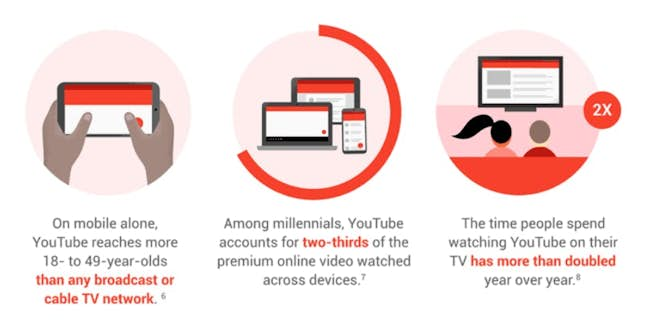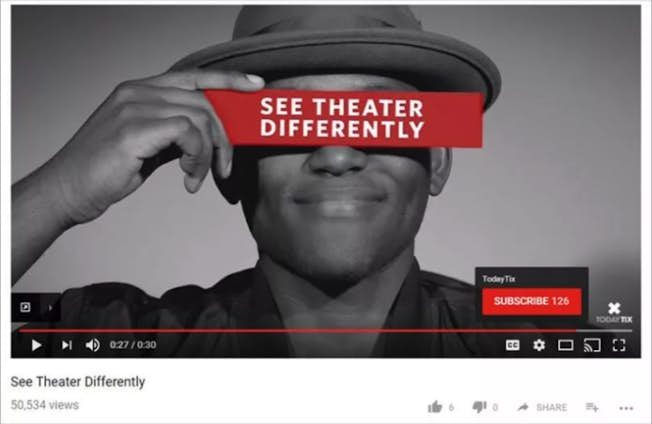There’s no denying that video marketing has been on the rise over the past few years, growing ever more popular and accessible for brands. While popular sites such as TikTok, Facebook and Instagram and your website are great places to invest, creating a YouTube channel might be the best place to promote your brand as individuals spend one billion hours each day watching videos on this platform.
Often referred to as the world’s ‘second-largest search engine’, YouTube can help people find your content quickly and drive engagement - if you know a few tricks and understand the fundamentals of making creative videos. Here are 10 of the best tips to grow your YouTube channel.

1. Build Your Videos Around a Single Keyword/Topic
Building your video around a single topic or keyword is the best way to drive traffic and grow your YouTube audience. Marketers that don’t know SEO risk missing this step to rank videos but it’s crucial to include it if you want your videos to get the maximum amount of viewers. Use a keyword tool like KeywordTool.io, which is specific to YouTube, to look for the most searched keywords in the niche you want to target.
It’s important to pick your keyword before you craft your video content as it helps you construct the best information around that specific topic. It also helps you remember to include your keyword naturally throughout the content so YouTube picks it up when closed captions are added. Once you choose a keyword, check out the videos that currently rank for that topic to make sure you’re on the right track in terms of intent and always optimize your title and descriptions. By doing this, you will generate more search traffic with SEO on YouTube.
2. Reuse Existing Top Performing Content
Of course, the best way to grow your YouTube channel is to create and distribute great content. But that content doesn’t always have to be built from scratch. Some of your best videos can be created from engaging, valuable, useful, and actionable content you have already.
Many people go to YouTube to find answers and how-to tutorials especially during the COVID-19 pandemic where people binge-watched 4 billion hours of ‘how to’ videos in just one year. So content that solves problems for your audience is a great way to drive traffic. Perform a content audit to discover the blogs, guides, and other high-performing pieces you currently have and think about how to repurpose them to create relevant and engaging videos.
Bear in mind that the most successful videos on YouTube are typically between one to five minutes long, so don’t feel you have to make a film or write a novel. Keep it short and sweet.
3. Engage with Your Audience
It's important not to overlook the fact that YouTube is a social media channel, and therefore demands social interaction. If you’re just posting videos without encouraging comments and discussion, you’re missing a trick.
YouTube rewards channels with great engagement, including overall time spent on channel, watch time, likes and dislikes, and most importantly, comments. So try to respond to every comment you receive (if possible!) and encourage users to engage with audio/visual prompts.
You can also take the time to visit other channels and engage, this could be a brand similar to your own or simply one you admire. Don’t always wait for the audience to take the initiative either. Post questions or comments that can drive engagement by asking questions relevant to the content or even just asking what content they like to see on your channel or would like to see more of. Plus, make sure to thank people for sharing on Youtube and other channels.
Think about using a social content distribution and engagement dashboard to help you keep track of key engagement metrics on YouTube.
4. Get Branded
So your content may be great, but does your channel look appealing? If you want visitors to take your YouTube channel seriously and subscribe, you need to look professional.
Improving your organization’s social branding will help users immediately recognize your content. So, if you have a blog or website, you probably already have some sort of look and feel to differentiate yourself from other individuals and/or companies. So it makes sense to carry over that branding to your YouTube channel. Here’s an example from gaming titan Nintendo with 8.12 million subscribers they provide great content about games and consoles that feature short videos of gameplay and behind the scenes snippets.

In addition to visual branding, don’t forget to add custom URLs to your channel header - and write an interesting bio about who you are and what your videos are about.
5. Promote Your YouTube Videos on Other Social Channels
One of the wonderful things about social media is that you can cross-promote content on different channels. Promoting your YouTube videos on your other social channels is the easiest way to grow your audience.
According to Digital 2021: Global Overview Report, there is a significant overlap in users across social media platforms with YouTube seeing huge engagement of over 90% amongst users of all the top channels. This means that it’s a channel to be reckoned with when it comes to marketing activities and engagement.

So think about what channels you are on? Facebook, Linkedin, Instagram, TikTok? There are many to choose from and lots of great ideas for social media videos. And if there’s a channel (such as Facebook) on which you want to post videos directly, you can always do a teaser for the full-length video on YouTube so you get optimum engagement on all channels. Also, don’t forget about your blog; you can post your videos there as well! And if you have a podcast, it can function very smoothly with your YouTube channel.
6. Show Up & Stand Out
If you’re running YouTube by yourself or as part of a small organization, it can be extremely beneficial to personalize the channel by participating in videos. When you put a face to a brand, your audience can more easily connect with you as an individual. This is especially important for vloggers; fitness, life, or business coaches; and solopreneurs.
Every video you make doesn’t need to include your face, but you should feature regularly enough to engage your audience. Additionally, if you are this type of YouTuber, use a photo of yourself on your channel (not your logo). See the example below from marketing guru Adam Erhart.

7. Post Great Thumbnails & Leverage YouTube Cards
They may seem like a small thing (well, they are), but thumbnails can have a big impact. YouTube advertises other videos via thumbnails in its sidebar, so you want yours to stand out among the pack.
The same goes for YouTube search. Videos with a catchy title and appealing thumbnail usually rank higher, even if the content itself isn’t as valuable because they have a higher click-through rate (CTR). To get your CTR where it needs to be, try using tactics such as highlighted areas, arrows, large text, and unexpected or eye-catching l images. See the examples below from Neil Patel.

We know that YouTube rewards channels that keep viewers on their pages longer. These longer average watch times mean people are engaged with your content. (You can see how long people stay on your videos by using YouTube analytics). By adding YouTube cards, you can include links to other videos or relevant content at the exact point where users drop off. There are a variety of card types to choose from such as a playlist, poll or donation and you can feature 5 cards per video that appear as a rectangular box or teaser in the right-hand corner of the video. Although users may abandon the video they are watching, they will be directed to your other content and remain on your channel, increasing your ranking.
8. Push for Subscriptions
One of the ways you know for sure that viewers are engaged with your channel is when they ‘subscribe’ to see any new videos that are posted. Ask viewers to subscribe to your channel in each video that you upload, and keep engaged with your existing subscribed users. (You can see your list of subscribers, here). Here’s an example of how the subscriber button can appear on a video:

Never pay for subscribers. This will only bring down your engagement and hurt the authenticity of your account in the long run. Remember, if you don’t ask your viewers to subscribe, you may be missing out on a lot of potential followers. After all, the more subscribers you get, the more chance you have of increasing watch time on YouTube.
9. Increase Your Uploading Frequency
This may sound intimidating at first, but to grow your audience, you need to increase your posting frequency to at least one video a week. Don’t worry; you don’t need a design firm or big advertising company to get this done. Today’s smartphones offer excellent video recording ability, and tools such as Animoto make editing videos easy to create video content on a budget. Consistency is of the utmost importance. Try to post at the same time each day or week (depending on your frequency), and keep your subscribers updated about when new videos will arrive. Then stick to your schedule.
10. Become a Social Video (& YouTube) Expert
Video as a content format keeps going from strength to strength. According to ‘The State of Video Marketing’ report, 86% of businesses use video as a marketing tool and 87% of marketers report positive ROI in its performance. As audiences become more visual and platforms such as TikTok grow in popularity, marketers should understand the role of video and how to use it effectively across all social media channels.
With DMI’s certified Social Media and Marketing course, you will learn how to successfully set up and manage a YouTube channel and create strategies that make your channel stand out from the crowd. You will also understand how video sits within your content mix across platforms, build your online audience and use advertising and analytics for successful visual campaigns.
First published February 2018, Updated October 2021
- Categories:
- Articles
- Display and Video Advertising
Upgrade to Power Membership to continue
your access to thousands of articles, toolkits, podcasts, lessons and much much more.
Become a Power Member- Login
- View Courses
- - - -
- Courses
- Resources
- - - -
- My Account
- Change Password
- Logout




